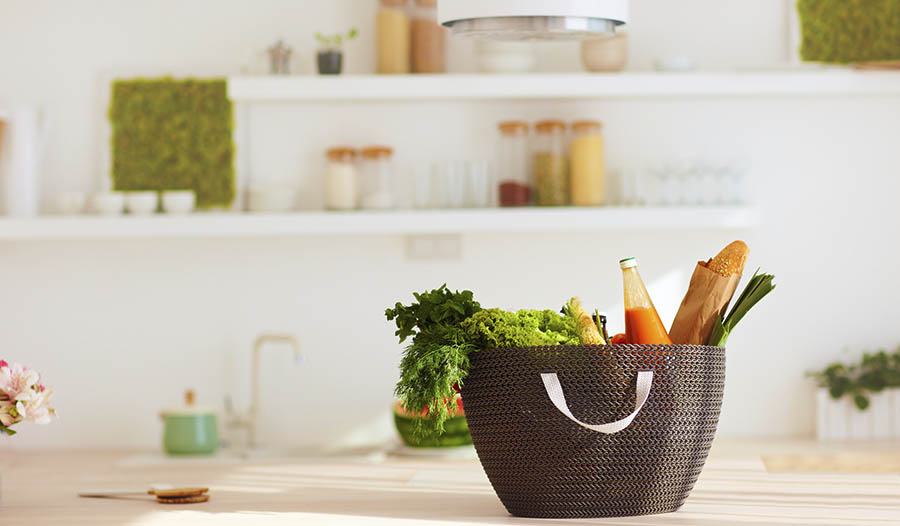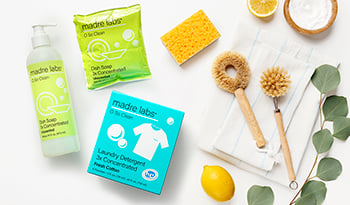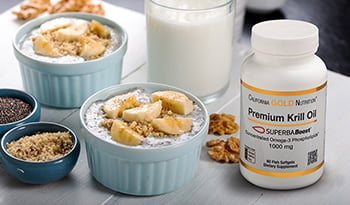Eco-Friendly Product Guide: The Top Easy Swaps for Your Home
DISCLAIMER:This blog does not intend to provide diagnosis...
- In this article:
- What Are Eco-Friendly Products?
- Benefits of Eco-Friendly Products
- Top Eco-Friendly Products for Your Home
- Sustainable Practices for the Home
- The Bottom Line

In today's environmentally conscious world, many of us are looking for ways to reduce our footprint on the planet. One simple yet effective approach is to incorporate eco-friendly products into our homes. But what exactly qualifies as "eco-friendly," and which products are the best choices?
This article will equip you with the knowledge to make eco-conscious swaps throughout your home, one step at a time.
What Are Eco-Friendly Products?
Eco-friendly products, also known as green products or sustainable products, are items that are manufactured, used, and disposed of in a manner that minimizes harm to the environment. These products aim to reduce carbon footprint, conserve natural resources, and promote ecological balance throughout their lifecycle.
Key Characteristics of Eco-Friendly Products:
- Sustainable Materials: Eco-friendly products are often made from renewable, recyclable, or biodegradable materials such as bamboo, recycled plastic, organic cotton, and reclaimed wood.
- Energy Efficiency: During production, usage, and disposal phases, these products are designed to consume less energy, reducing greenhouse gas emissions and preserving natural resources.
- Non-Toxic: Eco-friendly products prioritize the use of non-toxic, chemical-free ingredients to minimize harm to both the environment and human health.
- Minimal Packaging: They often come with minimal or biodegradable packaging to reduce waste and environmental pollution.
- Durability and Longevity: Eco-friendly products are designed to last longer, reducing the need for frequent replacements and reducing waste.
Benefits of Eco-Friendly Products
- Environmental Preservation: By choosing eco-friendly products, you contribute to reducing pollution, conserving resources, and protecting ecosystems, thereby mitigating climate change and preserving biodiversity.
- Healthier Living Spaces: Many conventional products contain harmful chemicals and toxins that can adversely affect indoor air quality and human health. Eco-friendly alternatives are non-toxic and promote healthier living environments.
- Cost Savings: While eco-friendly products may have a higher upfront cost, they often offer long-term savings through reduced energy consumption, lower maintenance costs, and fewer replacements.
- Ethical Considerations: Supporting eco-friendly brands and products aligns with moral values, promoting fair labor practices and responsible stewardship of natural resources.
Top Eco-Friendly Products for Your Home
Now that you understand the core principles let's explore some fantastic eco-friendly options to transform every room into a sustainable haven:
1. Kitchen
Banish Single-Use Plastic: Ditch single-use plastic and invest in reusable bags and food storage. These reusable options can eliminate the need for flimsy, landfill-bound plastic.
Wrap It Up Sustainably: Replace plastic wrap with reusable silicone wraps. These clever gadgets cling to containers of all shapes and sizes, keeping your food fresh without generating plastic waste.
Compost for Greener Gardens: If you keep a countertop compost bin or an outdoor compost bin, you can create nutrient-dense compost for your plants from kitchen scraps and yard waste. Composting reduces landfill methane emissions and provides a natural fertilizer for a thriving garden.
Opt for Reusable: Look for BPA or stainless steel water bottles.
Clean Green: Opt for eco-friendly cleaners over harsh chemical concoctions. These natural cleaning solutions are just as effective at keeping your kitchen sparkling while protecting your health and the environment. Consider making your own cleaning solutions with essential oils and vinegar for an extra eco-friendly touch.
2. Bathroom
Embracing sustainability in your bathroom can be as simple as swapping out a few everyday items.
Brush Up on Bamboo: Traditional plastic toothbrushes contribute significantly to plastic waste. Switch to biodegradable bamboo toothbrushes, a more natural and eco-friendly alternative.
Exfoliate Naturally: Ditch those plastic shower poufs! Bath accessories made from natural materials readily provide excellent exfoliation and biodegradation.
Refill and Reduce: Many companies now offer shampoo, conditioner, and body wash in refillable containers. This significantly reduces plastic waste compared to buying new bottles every time you run out. Look for brands that offer refill pouches or concentrates to minimize packaging even further.
Recycled Toilet Paper Matters: Toilet paper is a bathroom essential, but conventional options often come wrapped in plastic and use virgin wood pulp. Choose toilet paper made from 100% recycled paper to minimize deforestation and reduce plastic waste.
Conserve Every Drop: Every bit counts when it comes to water conservation. Install a low-flow showerhead to save water without sacrificing pressure during showers. Low-flow faucets are another excellent way to conserve water in the bathroom.
3. Living Room
The living room is the heart of the home, a place for relaxation, entertainment, and gathering with loved ones. Here are some eco-friendly swaps you can make in your living room:
Lighten Up with Energy-Efficient Bulbs: Banish the dim glow of traditional incandescent bulbs and embrace the bright future of LED technology. Energy savings from LED bulbs are up to 75% compared to their incandescent counterparts, resulting in significant savings on your electricity bills. Furthermore, they last much longer, so you won't have to keep replacing them as often.
Cozy Comfort from Recycled Materials: Indulge in the warmth of a throw blanket without the environmental guilt. Look for throws made from recycled materials like plastic bottles or wool scraps. These innovative blankets offer the same level of comfort and style as traditional options but with a sustainable twist. Imagine snuggling up with a blanket woven from repurposed plastic bottles – a cozy reminder of your commitment to a greener future.
Breathe Easy with Natural Air Purifiers: Houseplants are more than just decorative elements. As natural air purifiers, they remove toxins and pollutants from indoor air. This improves air quality and creates a more relaxing and healthier atmosphere in your living room. Choose low-maintenance varieties like snake plants, spider plants, or peace lilies that thrive with minimal care.
Sustainable Seating with Style: Furniture is a significant investment, so why not make it an eco-conscious one? When it's time to upgrade your sofa, coffee table, or bookshelves, opt for pieces crafted from reclaimed wood, fast-growing and renewable bamboo, or wood certified by organizations that promote sustainable forestry practices. These choices ensure your furniture doesn't contribute to deforestation while adding a touch of rustic charm or modern elegance to your living space.
Ditch the Paper Towels with Reusable Clothes: Paper towels are a single-use convenience that creates a mountain of waste. Embrace a more sustainable approach by swapping them for reusable microfiber cloths. Microfiber cloths are incredibly effective at cleaning surfaces and trapping dust and dirt without the need for harsh chemicals. Toss them in the washing machine after use, and they're ready to tackle another cleaning task.
4. Bedroom
The bedroom is your sanctuary, a place for restful sleep and rejuvenation. Here's how to create a serene and eco-friendly haven:
Embrace Organic Cotton Sheets: Indulge yourself in the luxurious comfort of organic cotton sheets. Organic cotton production utilizes significantly fewer pesticides and harmful chemicals compared to conventional cotton farming. This translates to a healthier sleep environment for you, free from potential irritants, and a more sustainable choice for the planet. Moreover, organic cotton sheets are soft and breathable, ensuring a cool and comfortable night's sleep.
Rest Easy with Recycled Down or Eco-Friendly Alternatives: Comforters are essential for warmth and comfort, but traditional down comforters often raise concerns about animal welfare and sustainability. A fantastic solution is to choose comforters made from recycled wood. These comforters provide the same level of warmth and coziness but utilize down feathers that have been reclaimed and repurposed.
For a completely vegan option, explore comforters filled with wool or bamboo. Wool offers exceptional temperature regulation, keeping you warm in winter and cool in summer. Bamboo is a rapidly renewable resource that creates a naturally breathable and hypoallergenic comforter.
Light the Way with Soy Candles: Enhance the ambiance of your bedroom with the gentle glow and delightful fragrance of soy candles. Unlike traditional paraffin wax candles, soy candles burn cleaner, releasing fewer harmful toxins into the air. Most soy candles are made with essential oils, providing a natural and calming aroma. For example, lavender oil is known for its sleep-promoting properties, while chamomile offers a sense of tranquility. Soy candles are an eco-friendly and aromatic way to establish a serene ambiance in your bedroom.
Breathe Easy with Nature's Air Purifiers: Certain plants go beyond aesthetics, functioning as natural air purifiers in your bedroom. Snake plants and spider plants are highly effective at purifying the air of toxins and pollutants, leading to improved air quality and better sleep. These low-maintenance varieties thrive in most lighting conditions, making them ideal additions to your bedroom without demanding excessive care.
Clean Consciously with Natural Laundry Detergent: Traditional laundry detergents may irritate your skin and harm the environment with harsh chemicals and optical brighteners. Opt for eco-friendly laundry detergents free of these harmful ingredients. Plant-derived cleaning agents are just as effective at removing dirt and stains, gentler on your skin, and kinder to the planet. Look for detergents with essential oils like lavender for a calming scent that lingers on your sheets.
Sustainable Practices for the Home
While eco-friendly products make a big difference, there are various additional steps you can take to create a sustainable home:
Save Energy
Switch off lights and electronics, unplug chargers, and adjust your thermostat to maximize efficiency.
Reduce Water Waste
Take shorter showers, fix leaky faucets, and fully load dishwashers before running them.
Recycle and Compost
Diligently sort your waste and compost food scraps and yard waste whenever possible.
The Bottom Line
Creating an eco-friendly home doesn't require a complete overhaul. By incorporating these simple swaps throughout your living space, you can make a significant difference. From energy-efficient light bulbs in the living room to organic cotton sheets in the bedroom, every sustainable choice adds up. Remember, small changes collectively have a big impact.
The most important takeaway is this: living an eco-friendly life is not only good for the planet, but it's also good for you and your loved ones. By making sustainable choices, you're creating a healthier home environment, reducing your environmental footprint, and setting a positive example for future generations. So, start small, embrace the journey, and together, we can build a more sustainable future, one eco-friendly home at a time.
References:
- 17 Best Zero Waste & Sustainable Bathroom Products. Conscious Life & Style. Published April 17, 2020. https://www.consciouslifeandstyle.com/zero-waste-sustainable-bathroom-products/
- 29 Sustainable Kitchen Products For an Eco-Friendly Home. Lomi. Accessed March 25, 2024. https://lomi.com/blogs/news/best-sustainable-kitchen-products
- Abdelrahman AL, Institute GH. These Are the Only Eco-Friendly Products That You Can Actually Trust. Good Housekeeping. Published March 10, 2020. https://www.goodhousekeeping.com/home-products/g31291481/eco-friendly-products/
- The Eco-Friendly Living Room & Guide. The Interior Editor. Published October 17, 2017. Accessed March 25, 2024. https://theinterioreditor.com/sustainable-living/the-eco-friendly-living-room-guide/
- What Are Eco-Friendly Products - 14 examples. Published July 27, 2023. https://sustainablewave.com/what-are-eco-friendly-products/
- Writer DPC. 14 Ideas to make your bedroom eco-friendly. Eco Friend. Published March 25, 2020. Accessed March 25, 2024. https://ecofriend.org/14-ideas-to-make-your-bedroom-eco-friendly/

 By Dr. Andrea Colon, N.M.D.
By Dr. Andrea Colon, N.M.D.


